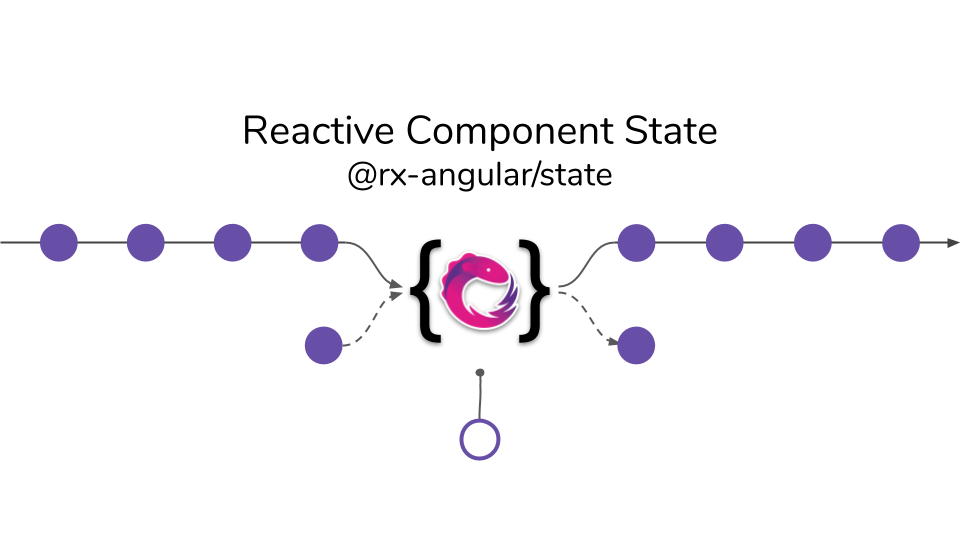@rx-angular/state
Version:
@rx-angular/state is a light-weight, flexible, strongly typed and tested tool dedicated to reduce the complexity of managing component state and side effects in angular
181 lines (125 loc) • 7.38 kB
Markdown
# @rx-angular/state
[](https://www.npmjs.com/package/%40rx-angular%2Fstate)
[](https://www.npmjs.com/package/%40rx-angular%2Fstate)

[](https://codecov.io/gh/rx-angular/rx-angular)

## Description
`@rx-angular/state` is a library designed to help developers effectively manage component-level state in Angular.
It offers a lightweight and intuitive API and automatic subscription handling, making it a perfect solution for handling state in any Angular component, service or directive.
This library offers unique features such as merging global state into local state, shared state selections, subscription-free interaction, and integration with imperative functions like component lifecycle and HostBindings.
It is an ideal alternative or complimentary library to global state management solutions like Akita, NgRx, and NgXs.
### Key features
- ⚡️ Fully reactive
- 🛡️ Strongly typed
- 🚀 Highly performant
### Introduction Video
[](https://www.youtube.com/watch?v=CcQYj4V2IKw)
## Installation
```
npm install @rx-angular/state
```
## Usage
### Functional Creation (NEW)
The new functional creation API lets you create and configure `RxState` in only one place.
```ts
import { rxState } from '@rx-angular/state';
import { RxFor } from '@rx-angular/template/for';
@Component({
template: `<movie *rxFor="let movie of movies$" [movie]="movie" />`,
imports: [RxFor],
})
export class MovieListComponent {
private movieResource = inject(MovieResource);
private state = rxState<{ movies: Movie[] }>(({ set, connect }) => {
// set initial state
set({ movies: [] });
// connect data source to state
connect('movies', this.movieResource.fetchMovies());
});
// select a property for the template to consume as an observable
movies$ = this.state.select('movies');
// select a property for the template to consume as a signal
movies = this.state.signal('movies');
}
```
The functional approach will be the new default approach for newer versions.
Read the [Migration Guide](https://rx-angular.io/docs/state/getting-started#migrate-to-new-functional-api) for a migration guide explaining how to upgrade your codebase to the new API.
### Class Based
Local Provider: Use RxState as a local provider in your component to make use of Angular's Dependency Injection.
With the new `inject` method:
```ts
@Component({
/*...*/
providers: [RxState],
})
export class RxStateInjectionComponent {
private state: RxState<{ foo: string }> = inject(RxState);
state$ = this.state.select();
}
```
With constructor based injection:
```ts
@Component({
/*...*/
providers: [RxState],
})
export class RxStateInjectionComponent {
state$ = this.state.select();
constructor(private state: RxState<{ foo: string }>) {}
}
```
Inheritance: Use RxState by extending it in your component.
```ts
@Component({
/*...*/
})
export class RxStateInheritanceClass extends RxState<{ foo: string }> {
value$ = this.select();
}
```
- [📄 Detailed Usage Documentation](https://rx-angular.io/docs/state/setup)
- [🧪 Extensive Testing Guide](https://www.rx-angular.io/docs/state/testing)
## API overview
With `@rx-angular/state`, you can easily manage your component state with a range of powerful methods. You can find a detailed API documentation [here](https://rx-angular.io/docs/state/api).
## Addons
The following complimentary tools are recommended for use with RxState to improve the development experience and optimize application performance.
### [🚀 @rx-angular/template](https://www.rx-angular.io/docs/template)
Reduce the amount of boilerplate code required in templates and bring rendering performance to next level.
### [⚒️ @rx-angular/state/effects](https://rx-angular.io/docs/state/effects)
Reactively handle side effects, forget about the `subscribe` API and potential memory leaks.
### [📡 @rx-angular/state/actions](https://rx-angular.io/docs/state/actions)
Create composable action streams for user interaction and backend communication with a minimal memory footprint.
### [✨ @rx-angular/cdk/transformations](https://www.rx-angular.io/docs/cdk/api/transformation-helpers)
Simplify data structures management. Create, modify, convert arrays and objects with ease.
### [🔬 @rx-angular/eslint-plugin](https://www.rx-angular.io/docs/eslint-plugin)
Enforce best practices for building reactive, performant, and Zone-less Angular applications.
### [🧩 Selections](https://www.rx-angular.io/docs/state/api/rxjs-operators)
Optimize state selections and data transfer, ensure only the necessary data is transferred.
## Version Compatibility
| RxAngular | Angular |
|-----------|------------|
| `^18.0.0` | `^18.0.0` |
| `^17.0.0` | `^17.0.0` |
| `^16.0.0` | `^16.0.0` |
| `^15.0.0` | `^15.0.0` |
| `^14.0.0` | `^14.0.0` |
| `^2.0.0` | `>=13.0.0` |
| `^1.0.0` | `>=12.0.0` |
Regarding the compatibility with RxJS, we generally stick to the compatibilities of the Angular framework itself, for more information about the compatibilities of Angular itself see the [official guide](https://angular.dev/reference/versions).
## Contribution
If you want to contribute to this project, please follow [our guideline](https://github.com/rx-angular/rx-angular/blob/main/CONTRIBUTING.md).
## Additional materials
- [💾 Research on Reactive Ephemeral State](https://dev.to/rxjs/research-on-reactive-ephemeral-state-in-component-oriented-frameworks-38lk)
- [📜 Design Documents](https://hackmd.io/wVkWRc3XQWmtM6YcktRTrA)
- [✍️Tutorials](https://www.rx-angular.io/docs/state/tutorials/basic-tutorial/setup)
- [🍳 Recipes](https://rx-angular.io/docs/state/recipes/use-rxstate-as-global-state)
- [💻Counter Demo](https://stackblitz.com/edit/rx-angular-state-counter-demo?file=src%2Fapp%2Fcounter%2Fcounter.component.ts)
- [🎥 Tackling Component State Reactively (Live Demo at 24:47)](https://www.youtube.com/watch?v=I8uaHMs8rw0)
- [🎥 Extending Angular for the Reactive Web](https://youtu.be/pkN6CeZ8h_U?t=5913)
- [🎥 Michael explains rx-state to webdave_de (Livestream, German)](https://youtu.be/cKUFcY8QkYM)
### OSS Example Applications
- [💻 Fully-reactive Zone-Less Angular/Ionic Progressive Web Application](https://startrack-ng.web.app/search) - [Mike Hartington](https://twitter.com/mhartington)
- [💻 High performant zone-Less Angular Progressive Web Application](https://angular-movies-a12d3.web.app/list/category/popular) - [TasteJS](https://github.com/tastejs/angular-movies)
- [💻 Zone-Less Angular Application - Tour of heroes](https://github.com/BioPhoton/tour-of-heroes) - [Michael_Hladky](https://twitter.com/Michael_Hladky)
- [💻 Zone-Less Todo MVC](https://github.com/edbzn/rx-angular-todo-mvc) - [Edouard Bozon](https://twitter.com/edbzn)